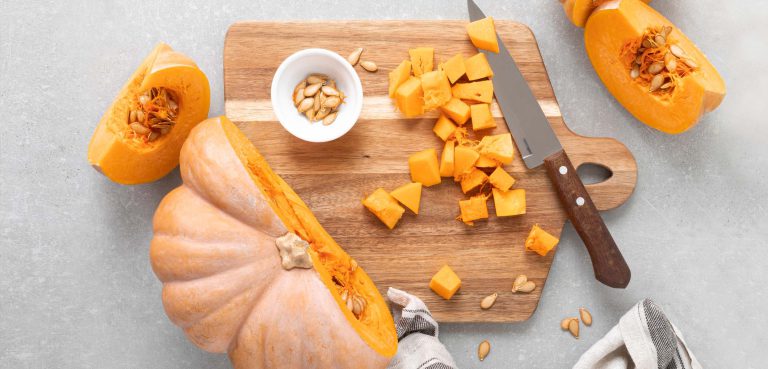It’s definitely pumpkin season, as you can tell by the flood of pumpkin-spiced items on menus and grocery-store shelves. Though, as we told you recently, many “spiced” items actually contain no pumpkin, which means many of those choices are not the most healthy options. But, pumpkin itself – real pumpkin – is surprisingly healthy.
Real pumpkin, as an ingredient in pie, bread, pasta or even beer, has several health benefits that you’ve probably never thought of.
So, put down that pumpkin spice grande latte and pick up our favorite gourd for these benefits:
It’s good for your waistline
Often overlooked as a great source of fiber, pumpkin is very high in fiber. A cup of cooked pumpkin has three grams of fiber, which is more than a whole apple. While it’s a good source of fiber, it’s also low in calories. A one-cup serving has only 45 calories.
Pumpkin’s also a great post-workout food. It’s packed with potassium, which helps restore your body’s electrolyte level after a tough gym session “” even better than bananas, which get all the attention. A cup of cooked pumpkin has 560 milligrams of the nutrient, compared to only around 420 for bananas.
It’s a cholesterol buster
Seeds, especially the large ones that come from pumpkins, have been proven fighters against high cholesterol levels. The seeds are high in chemicals called phytosterols. The substance has been shown in several studies to reduce LDL cholesterol levels. LDLs are better-known as “bad cholesterol.”
It’s good for your eyes
Pumpkin is also high in vitamin A, which helps with your eyesight. A cup of mashed pumpkin has more than twice the recommended daily dose of vitamin A “” even more than carrots. Pumpkins also have high levels of beta-carotene, which your body naturally converts into more vitamin A.
Vitamin A helps eye health, and has been shown to particularly be helpful for maintaining night vision, according to the National Institutes of Health (NIH).
It can help ward off colds
Vitamin C’s effect on fighting the common cold is still debated, but for those who buy into it pumpkins offer another good source for the nutrient. That cup of cooked pumpkin? It has more than 12 milligrams of vitamin C, which is almost a quarter of the daily recommended serving, according to the NIH.
It can help ward off depression
Pumpkin seeds are high in tryptophan, the amino acid that is more associated with the “turkey coma” after Thanksgiving dinner. But the substance is key to the production of serotonin, a neurotransmitter that is regarded by experts to be the chemical that is responsible for maintaining mood balance. A deficit has often been associated with depression.
Even when it comes to pumpkin, keep healthy options in mind. Pie is not the healthiest one.
One slice has around 320 calories, 13 grams of fat, 46 grams of carbohydrates, 450 milligrams of sodium and 35 milligrams of cholesterol, according to the U.S. Department of Agriculture. That’s about 20 percent of the recommended daily intake of fat, 19 percent of sodium, 15 percent of carbohydrates, and 12 percent of cholesterol. So, keep it to one slice.

